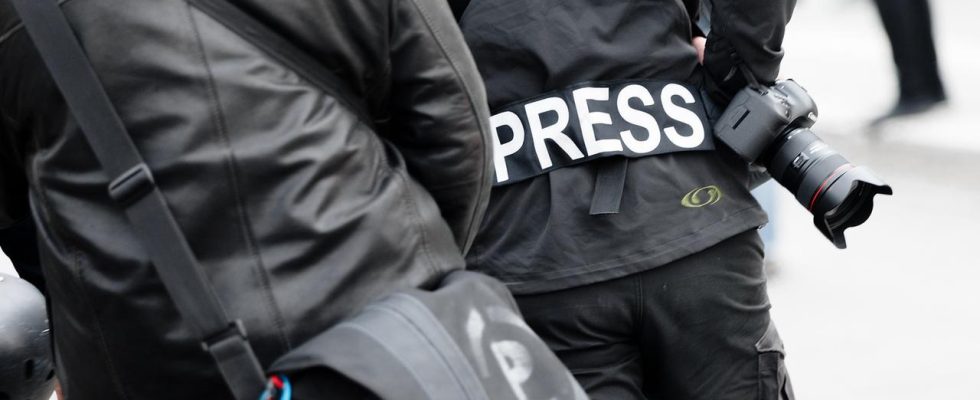world mirror
A murder, a wiretapping scandal, lawsuits against unpopular reporting: Greece occupies the lowest place of all EU states in the press freedom rankings. How Greek journalists live – and work – with it.
Widow Statha Karaivaz almost never goes to the place where her husband was shot. She still shudders to this day. There is now a memorial plaque made of black stone here. It was Friday afternoon, April 9, 2021, when a neighbor called: There was a shooting in the neighborhood. Giorgios Karaivaz was always very careful and parked the car in the garage. Not on this day. Surveillance cameras filmed two men on a motorcycle, one got off and shot the journalist at close range.
“It was murder,” says Vassilis Panagiotopoulos from Reporters Without Borders. Giorgios Karaivaz, a respected police reporter, appeared in many programs – his main topics: corruption in the Greek police and the relationships between big business, politics and organized crime.
For “Reporters Without Borders” the journalist’s murder, which has not yet been solved, is a clear attack on press freedom. In their global press freedom ranking, Greece ranks 107th, the lowest place of all EU countries. “Two years after the murder of Giorgios Karaivaz, we have not seen any significant progress. We have not received any satisfactory answers about the status of the public prosecutor’s investigation – and that is one of the main reasons for the poor ranking,” said Panagiotopoulos.
Espionage using “Predator” software
There are other reasons. The journalist Thanasis Koukakis researches and publishes primarily on cases of white-collar crime. He says that in Greece the secret service is also said to have violated freedom of the press. Koukakis wrote several articles for the “Financial Times” in which he criticized the current Greek legislation: according to his thesis, it encourages money laundering and tax evasion.
The government initially tried to put pressure on the newspaper and prevent reporting, he says. At the same time, he himself was targeted by the secret service: “From that moment on, the Greek national intelligence service began to monitor me. First with conventional technology, then with the ‘Predator’ software.”
According to research by Koukakis and several other colleagues, journalists, the opposition leader and even government ministers were allegedly tapped using the spy software that was covertly installed on the smartphone.
Statha Karaivaz’s husband was a well-known police reporter – unknown people murdered him in 2021.
Million dollar lawsuit intelligence chiefs
A nationwide scandal in which the secret service of Prime Minister Kyriakos Mitsotakis’ government was blamed. The responsible office chief, Grigoris Dimitriadis, a nephew of Mitsotakis, was fired. But to date, the responsibilities have not been fully clarified – and there has been little coverage in the major media.
Thodoris Chondrogiannos works for Reporters United, a research team based in Athens. The journalists were among those who uncovered the scandal. As a result, the sacked office boss, Dimitriadis, sued her for enormous sums. “On the day of his resignation, he filed a lawsuit against us. Dimitriadis demanded an amount of more than half a million euros from all defendants,” says Chondrogiannos. “This sum is very high by Greek, but also European standards.”
Using expensive lawsuits to bring independent journalists to their knees is a common practice in Greece, he says. They are constantly trying to intimidate “Reporters United” in this way.
Business journalist Thanasis Koukakis says he was first put under pressure and then spied on.
“Self-censorship of journalists”
But they are often the only ones who report on grievances. Many large media groups are owned by powerful business people, mostly shipping companies with great economic and political influence. An example: Vangelis Marinakis, ship owner, owner of the Olympiakos Piraeus football club and at the same time owner of a media empire. If a media company belongs to a shipping company, explains Chondrogiannos, it does not report on this or other shipping companies: “This leads to self-censorship by journalists who work there.”
Reporters Without Borders sees structural problems in Greece as a threat to press freedom. “It’s this triangle of power: we have the media, business people and politics. It’s not just like that in Greece. But the combination of these factors is unique: we have a surveillance scandal, a murder of a journalist, the lawsuits and also the problem of ownership,” says Panagiotopoulos. It takes a lot of courage in Greece to fight for freedom of the press.
You can see these and other reports on Sunday at 6:30 p.m. in “Weltspiegel”.

